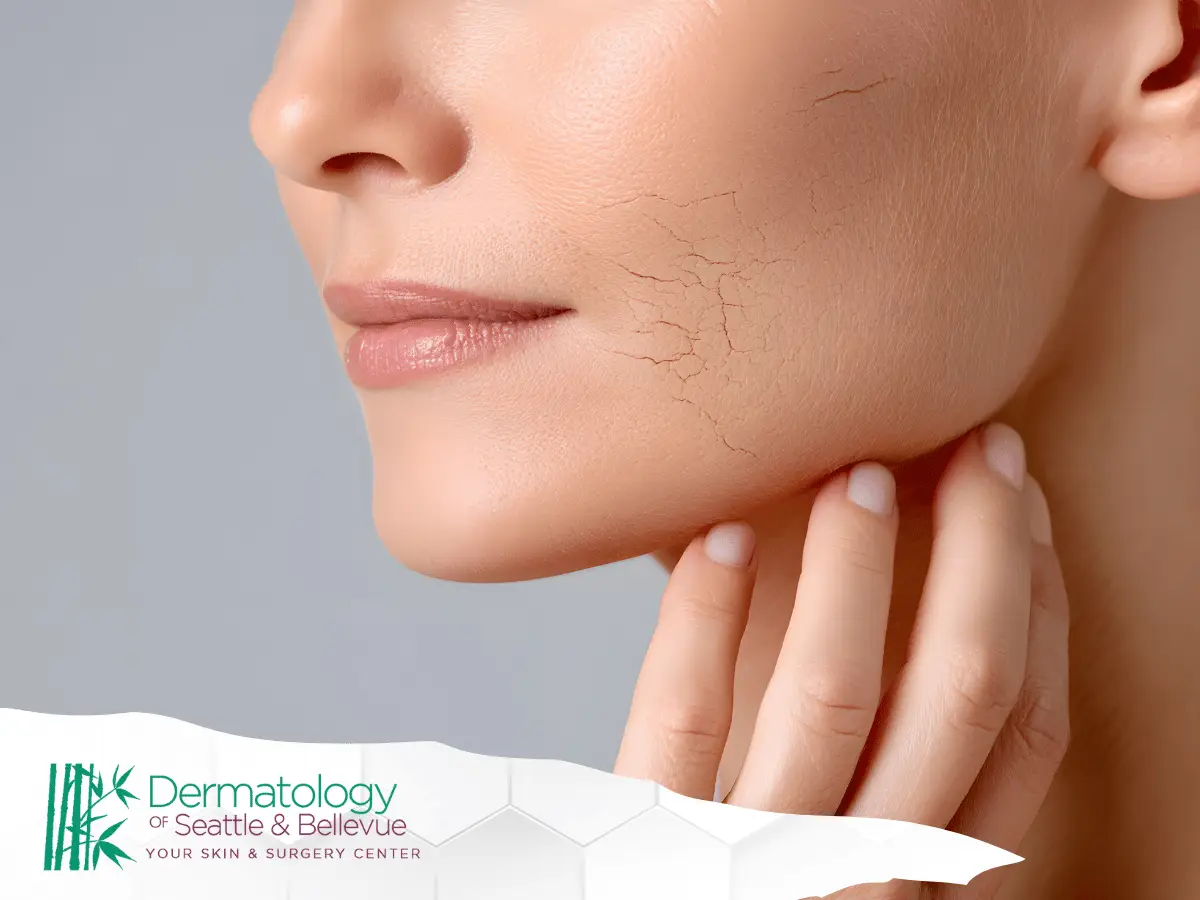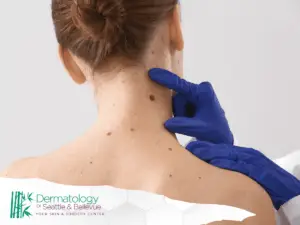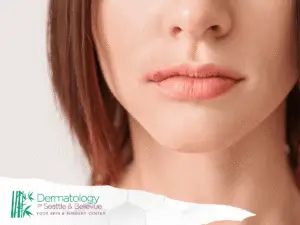Quick Summary
- Stress activates the HPA axis and raises cortisol, increasing oil, inflammation, and slowing healing. This can worsen acne, eczema, rosacea, and psoriasis.
- Chronic stress weakens the skin barrier, causing moisture loss, dryness, and sensitivity. This raises irritation risk and can trigger eczema flare-ups.
- Anxiety can intensify itching and histamine release, leading to hives or stress rashes. Scratching can worsen inflammation and prolong symptoms.
- Manage stress with regular exercise, good sleep, balanced diet, hydration, and limiting caffeine/alcohol. Mindfulness, yoga, and breathing can reduce flare-ups.
- Use gentle cleansing, consistent moisturizing, and daily sunscreen, and avoid known triggers. See a dermatologist if symptoms persist or are severe.
Stress and Skin Why Anxiety Makes Conditions Worse and What Helps
In today’s fast-paced world, stress and anxiety have become unwelcome companions for many. While their impact on mental health is widely recognized, fewer people understand how stress can wreak havoc on skin health. As a leading expert in dermatology, I am here to explain how anxiety exacerbates skin conditions and, more importantly, what you can do to alleviate these issues.

Stress is not just a mental burden; it has tangible effects on the body, particularly the skin. The skin is the largest organ of the human body and is often the first to show signs of stress. Stress triggers a cascade of hormonal responses that can lead to inflammation, increased oil production, and a compromised skin barrier. These reactions can exacerbate existing skin conditions such as acne, eczema, rosacea, and psoriasis.
Hormonal Response and Skin Impact
Stress activates the hypothalamic-pituitary-adrenal (HPA) axis, leading to the release of cortisol and other stress hormones. These hormones can increase oil production, making the skin more prone to acne and other issues. Additionally, stress hormones can disrupt the skin’s natural barrier, leading to dryness and increased sensitivity. This hormonal imbalance can also delay the skin’s healing process, making it more difficult for existing skin conditions to improve.
Inflammation and Skin Conditions
Chronic stress can cause prolonged inflammation, which is detrimental to skin health. Inflammation can worsen conditions such as eczema and psoriasis by triggering flare-ups. It can also lead to the development of new skin issues, such as stress-induced rashes. The body’s inflammatory response can be heightened under stress, making the skin more reactive and prone to irritation.
Skin Barrier and Moisture Loss
Stress impacts the skin’s ability to retain moisture, leading to dryness and flakiness. This moisture loss weakens the skin barrier, making it more susceptible to environmental aggressors and allergens. A compromised skin barrier can exacerbate conditions like eczema and make the skin more vulnerable to infections. Proper hydration and skincare are essential to counteract these stress-induced changes.
Psychological Factors and Skin Perception
The psychological impact of stress can alter how individuals perceive their skin condition. Stress can lead to increased self-consciousness and anxiety about one’s appearance. This heightened awareness can cause individuals to pick at their skin, worsening conditions like acne and dermatitis. Psychological stress can also affect the efficacy of skincare treatments, as stress can reduce adherence to skincare routines.
How Stress Affects Skin Conditions
Acne: The Cortisol Connection
- Hormonal Fluctuations: Stress-induced cortisol release leads to an increase in sebum production, contributing to clogged pores. This hormonal response can also lead to an imbalance in other hormones, exacerbating acne symptoms. Increased sebum production creates an ideal environment for acne-causing bacteria to thrive, leading to inflammation and breakouts.
- Inflammation and Bacterial Growth: Stress can intensify the inflammatory response, aggravating acne lesions and causing more severe breakouts. Bacterial growth is further stimulated by the excess oil, leading to pustules and cysts. This can result in more noticeable scarring and prolonged healing times.
- Skin Picking and Acne Aggravation: Stress can lead to nervous habits such as skin picking, which can worsen acne by spreading bacteria and causing more inflammation. This behavior can lead to post-inflammatory hyperpigmentation and scarring, making acne appear more severe. Addressing the psychological aspects of stress is crucial in breaking this cycle.
Eczema: Barrier Disruption and Flare-Ups
- Compromised Skin Barrier: Stress weakens the skin barrier, making it less effective at retaining moisture and protecting against irritants. This leads to increased transepidermal water loss, causing dryness and irritation. A compromised barrier also allows allergens and pathogens to penetrate the skin, triggering eczema flare-ups.
- The Itch-Scratch Cycle: Stress can intensify itching sensations, leading to more frequent scratching and worsening of eczema symptoms. Scratching damages the skin further, perpetuating the itch-scratch cycle. Breaking this cycle is essential to managing eczema effectively.
- Inflammatory Response: Stress can trigger the release of pro-inflammatory cytokines, exacerbating eczema symptoms. This inflammatory response can cause redness, swelling, and increased sensitivity in the skin. Targeted treatments that address inflammation can help manage stress-induced flare-ups.
Rosacea: Triggers and Redness
- Vascular Response: Stress can cause vasodilation, leading to increased blood flow and flushing in individuals with rosacea. This vascular response results in heightened redness and visible blood vessels. Managing stress is crucial to controlling these vascular changes and reducing flare-ups.
- Inflammation and Sensitivity: Chronic stress can heighten skin sensitivity and inflammation, exacerbating rosacea symptoms. This can lead to a cycle of redness and irritation that is difficult to break. Identifying and avoiding triggers, along with stress management, can help alleviate these symptoms.
- Psychological Impact: The visible nature of rosacea can cause stress and anxiety, further worsening the condition. Stress management techniques can help improve self-esteem and reduce the psychological burden of rosacea. Seeking support from mental health professionals can also be beneficial.
Psoriasis: Immune System and Stress
- Immune System Activation: Stress can trigger the release of stress hormones that activate the immune system, leading to psoriasis flare-ups. This immune response causes increased skin cell turnover, resulting in the characteristic plaques of psoriasis. Managing stress is crucial to reducing the frequency and severity of flare-ups.
- Inflammatory Pathways: Stress-induced inflammation can worsen psoriasis symptoms, causing redness, scaling, and discomfort. Targeted treatments that address inflammation can help manage these symptoms. Combining stress management with medical treatments can provide comprehensive relief.
- Psychosocial Effects: The visible nature of psoriasis can lead to stress, anxiety, and depression, creating a vicious cycle. Addressing the psychological impact of psoriasis is essential for effective management. Support groups and therapy can provide valuable coping strategies.
Stress-Induced Itchiness and Rashes

Pruritus: The Itch That Won’t Quit
- Histamine Release: Stress can trigger the release of histamines, leading to intense itching and the development of rashes. These histamines can cause hives or stress rashes, further aggravating the skin. Antihistamines and stress reduction techniques can help alleviate symptoms.
- The Vicious Itch-Scratch Cycle: Stress-induced itching can lead to scratching, worsening the skin’s condition and causing more stress. This cycle can be difficult to break without appropriate interventions. Moisturizing and soothing skincare products can help reduce itching.
- Psychological Triggers: Anxiety and stress can heighten the sensation of itching, making it more difficult to ignore. Addressing psychological triggers through therapy or relaxation techniques can help manage stress-induced itching. Mindfulness practices can also provide relief by diverting attention from the itch.
Stress Rashes: Identifying and Managing
- Common Stress Rashes: Stress can cause various types of rashes, including hives and eczema flare-ups. These rashes are often characterized by redness, swelling, and itching. Identifying stress as a trigger can help in managing and preventing these rashes.
- Treatment Options: Stress rashes can be managed with topical treatments, antihistamines, and stress-reduction techniques. It is important to address both the physical and psychological aspects of stress-induced rashes. Consulting a dermatologist can provide guidance on effective treatment options.
- Prevention Strategies: Preventing stress rashes involves managing stress through lifestyle changes and relaxation techniques. Regular exercise, adequate sleep, and mindfulness practices can help reduce stress levels. Avoiding known triggers and maintaining a healthy skincare routine are also essential.
Strategies to Manage Stress and Improve Skin Health
Managing stress is crucial for maintaining healthy skin. Here are some strategies to consider:
Lifestyle Modifications
- Exercise Regularly: Physical activity can help reduce stress by releasing endorphins, the body’s natural mood elevators. Aim for at least 30 minutes of moderate exercise most days of the week. Exercise also improves circulation, promoting healthy skin by delivering oxygen and nutrients to skin cells.
- Sleep Well: Adequate sleep is essential for skin repair and stress reduction. Establish a regular sleep schedule and ensure your sleeping environment is conducive to rest. Quality sleep supports the skin’s natural repair processes and helps maintain a healthy complexion.
- Balanced Diet: A diet rich in antioxidants, vitamins, and minerals supports skin health. Include plenty of fruits, vegetables, and omega-3 fatty acids in your meals. Proper nutrition provides the building blocks for collagen production and skin repair.
- Hydration: Staying hydrated is crucial for maintaining healthy skin and overall well-being. Drink plenty of water throughout the day to support skin hydration and flush out toxins. Herbal teas and water-rich fruits can also contribute to your daily hydration needs.
- Limit Caffeine and Alcohol: Both caffeine and alcohol can dehydrate the skin and exacerbate stress. Limiting their intake can help maintain skin hydration and reduce stress-related skin issues. Opt for herbal teas or water to keep your body and skin hydrated.
Mindfulness and Relaxation Techniques
- Meditation and Yoga: These practices can significantly reduce stress levels and improve overall well-being. Incorporate them into your daily routine for the best results. Yoga combines physical movement with mindfulness, enhancing both physical and mental health.
- Deep Breathing Exercises: Simple breathing exercises can help calm the mind and reduce anxiety. Try deep breathing or progressive muscle relaxation techniques. These exercises can be done anywhere, providing a quick and effective way to manage stress.
- Time Management: Organize your schedule to minimize stress. Prioritize tasks and set realistic goals to avoid feeling overwhelmed. Effective time management can help create a balanced lifestyle, reducing stress and improving skin health.
- Mindful Breaks: Incorporate short breaks into your day to practice mindfulness and relaxation. These breaks can help reset your mind and reduce stress levels. Use these moments to focus on your breath, perform gentle stretches, or engage in a brief meditation.
- Journaling: Keeping a stress journal can help identify stressors and track your progress in managing them. Writing down your thoughts and feelings can provide clarity and reduce anxiety. Reviewing your journal can help identify patterns and develop effective coping strategies.
Skincare Routine Adjustments

by PLANTADEA (https://unsplash.com/@plantadea)
- Gentle Cleansing: Use mild, fragrance-free cleansers to avoid irritating stressed skin. Avoid over-cleansing, which can strip the skin of its natural oils and exacerbate dryness. Opt for hydrating cleansers that maintain the skin’s natural moisture balance.
- Moisturize: Keep the skin hydrated with a suitable moisturizer to strengthen the skin barrier. Choose products with ingredients like hyaluronic acid and ceramides that lock in moisture. Regular moisturizing can help reduce dryness and improve skin resilience.
- Sun Protection: Stress can make the skin more sensitive to UV rays. Always apply a broad-spectrum sunscreen to protect your skin. Sunscreen is essential for preventing sun damage and reducing the risk of stress-related skin issues.
- Avoid Triggers: Identify and avoid specific skincare or lifestyle triggers that worsen your skin condition. Common triggers include certain foods, skincare products, and environmental factors. Keeping a skincare journal can help identify these triggers and guide adjustments.
- Regular Exfoliation: Gentle exfoliation can help remove dead skin cells and promote cell turnover. Avoid harsh scrubs that can irritate stressed skin; opt for chemical exfoliants like alpha-hydroxy acids. Regular exfoliation can improve skin texture and clarity.
When to Seek Professional Help
If stress-related skin issues persist despite lifestyle changes, it may be time to consult a dermatologist. As a compassionate and experienced dermatologist, I offer personalized treatment plans that consider the unique needs of each patient. My approach combines advanced medical technology with empathetic patient care, ensuring effective and safe solutions for skin, hair, and nail concerns.
Dermatological Treatments for Stress-Exacerbated Skin Conditions
- Medications: Prescription medications can help manage severe acne, eczema, rosacea, or psoriasis. These medications may include topical treatments, oral medications, or biologics. A dermatologist can determine the most appropriate treatment based on your specific condition and needs.
- Therapies: Light therapy and other dermatological treatments can be effective for certain conditions. Phototherapy can reduce inflammation and improve skin appearance in conditions like psoriasis and eczema. A dermatologist can recommend suitable therapies based on your skin type and condition.
- Cosmetic Procedures: For those interested in enhancing their appearance, treatments like chemical peels, laser therapy, or injectables can provide natural, subtle results. These procedures can address skin texture, pigmentation, and signs of aging. A dermatologist can help determine the best options to achieve your desired outcomes.
- Child and Teen Dermatology: For young patients, I provide age-appropriate treatments and clear communication to ensure they receive the best care. Early intervention can prevent the worsening of skin conditions and promote healthy skin habits. Education and support are key components of pediatric dermatology.
- Holistic Approaches: In addition to traditional treatments, holistic approaches that consider the mind-body connection can be beneficial. Integrating stress management techniques with dermatological care can enhance treatment outcomes. A dermatologist can guide you in incorporating holistic strategies into your skincare regimen.
Conclusion
Understanding the connection between stress and skin health is the first step toward effective management of skin conditions. By addressing stress through lifestyle changes, mindful practices, and appropriate skincare, you can improve your skin’s resilience and appearance. If needed, professional dermatological care is available to offer targeted solutions that align with your individual needs.
Remember, you are not alone in this journey. With the right care and guidance, you can achieve healthier skin and a more balanced life. Together, we can navigate the challenges of stress and skin health to ensure you look and feel your best. Embracing a holistic approach to stress management and skin care can empower you to take control of your well-being and enjoy a radiant, healthy complexion.





